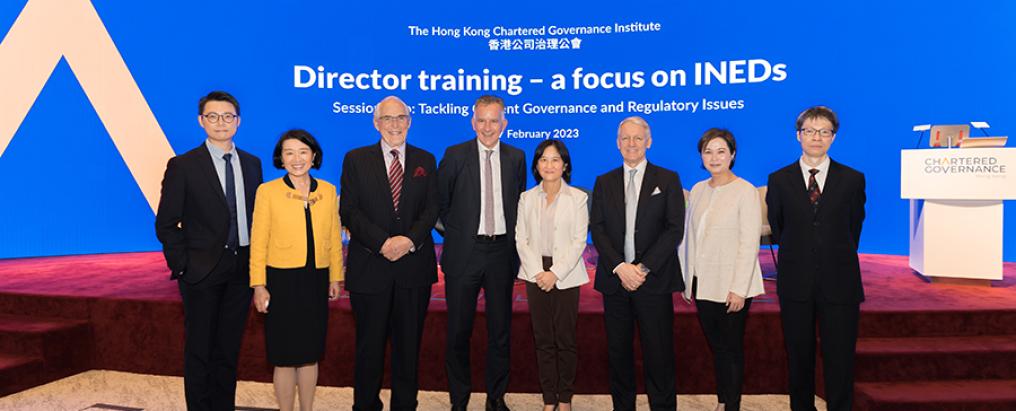CGj interviews Edith Shih FCG(CS, CGP) HKFCG(CS, CGP)(PE), Past International President and Institute Past President, and Executive Director and Company Secretary, CK Hutchison Holdings Ltd, on the key insights her company has gained in the process of developing its sustainability strategies and processes.
CK Hutchison is a conglomerate with multiple divisions – how do you adapt ESG practices so they are suitable for different business sectors or industries? Also, what do you see as core practices that apply across all sectors and what are the ESG factors that need to be considered sector by sector?
‘We have four very different core businesses, and how each business interacts with society and the environment is different. Our ports tend to be hazardous places with machinery and types of work that require working from heights, for example. Occupational health and safety is therefore crucial for employees working in port environments.
While health and safety is still important for our employees working in our retail stores, their work is not what you would define as hazardous. Retail is incredibly focused on plastics reduction since retailers generally consume large amount of plastics – ports on the other hand will not need to be similarly focused on plastics reduction.
So you can see, what the businesses focus their time on will be different. At head office we first need to make sure these businesses are conducting a materiality assessment and stakeholder engagement to ensure they are focusing on the sustainability topics that matter most to their industries, and second we also need to ensure we are supporting them with the resources they need to effectively manage these material impacts.
There are, however, topics that matter to all of our businesses, no matter the industry – for example action on climate change or the importance of creating inclusive and diverse workplaces. Where we identify these cross-cutting topics, we are creating Group-level action plans. Take action on climate change: two years ago we asked our businesses to set science-based targets, assess the pathway to net zero and calculate Scope 3 greenhouse gas emissions. These are what we see as fundamental to taking leading practice approaches no matter the industry and I am pleased to say we have made significant progress across all of these actions.’
Related to this, how do you create the governance structures for ESG reporting across sectors in a multi-business, multi-segment conglomerate? How does one ensure that particular business segments are starting the journey on ESG reporting in the right way, in particular ensuring that the right reporting principles filter or cascade down?
‘Despite the differences in the types of businesses we are in, we have created a rigorous governance structure that is reflected across all businesses. Starting at head office, our tone from the top is set by the board-level sustainability committee, which is supported by a sustainability working group comprising executives from across our core departments, such as finance, treasury, corporate affairs, HR, legal and investor relations.
Similarly all listed group companies also have a board-level sustainability committee, of which I am a member for four and a chair for three. Every core business also has sustainability working groups that are chaired by C-suite management that direct their sustainability strategies. To ensure the businesses are supported with the day-to-day implementation of our sustainability strategies, these businesses are resourced with sustainability professionals with the necessary expertise needed to drive forward their programmes.
To ensure high standards of data collection and reporting, we have a Group-wide reporting process where all businesses must report into head office on the same performance metrics and in the same way. We used to use Excel spreadsheets for this activity, but we have now transitioned to using an online data management system that will enable us to do this more effectively. To further provide rigour to our approaches, our internal audit team receives all data and conducts internal audit checks to ensure consistency and accuracy.’
A challenge, even for smaller companies, is how do you make sure that the board is getting the right and relevant information from management?
‘Materiality assessments and stakeholder engagement that is refreshed on an ongoing basis ensures the Group is focusing on the topics that matter the most. Our sustainability strategies are directly built upon these assessments and the sustainability committee first needs to approve these strategies and goals, and it is also their responsibility to monitor progress towards these strategies.’
Could you give real life examples or anecdotes of where ESG practices have made a difference to the business?
‘Sustainability for us is about value creation and there are many ways in which it creates value for us. There are many examples with reference to our businesses I could mention, but the three below are particularly important.
1. Cost of capital. We know our investors are placing an increasing focus on sustainability in their investment decision-making, both on the debt and equity side. If we do not focus enough, and we do not tell our story well enough, then we may find in the future our cost of capital goes up. Sustainability is becoming increasingly financially material from this standpoint.
2. New product development and customer attraction. By using sustainability as a lens for new product development we are ensuring we keep pace with new emerging trends and what our customers want from us. We recognise our customers are setting net zero goals and we need to ensure we are their preferred partners to achieve their ambitions. Take the Ports division – increasingly we are hearing from shipping liners and port authorities that they care about emissions reduction. This is also incredibly important to our infrastructure division where we operate a vast amount of infrastructure services in countries that have committed to net zero. It is therefore important to set emissions reduction targets and have a net zero transition plan in order to stay competitive.
3. Employee attraction and retention. We are increasingly aware that current and prospective employees want to work for companies that make a positive difference to the world. Particularly in Europe, we know that younger employees are factoring how sustainable a company is into their decision-making about where to work.’
Ms Shih was a presenter, alongside five other senior managers from CK Hutchison Holdings Ltd, at the second session of the Institute’s new ESG Reporting Certification Course held on 15 February 2023. She was interviewed by Sharan Gill, Associate Editor, CGj.



